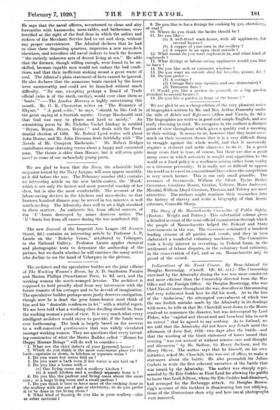Indiscretions of the Naval Censor. By Rear-Admiral Sir Douglas Brownrigg.
(Cassell. 12s. 6d. net•.)—Tho Censorship exercised by the Admiralty during the war was more consistent and more efficient than the Censorship directed from the War Office and the Foreign Office. Sir Douglas Brownrigg, who was Chief Naval Censor throughout the war, describes in this amusing and very indiscreet book how he did his work. As to the loss of the ' Audacious,' the attempted concealment of which was the one foolish mistake made by the Admiralty in its dealings with news, he tells us that Mr. Churchill went down to the House resolved to announce the disaster, but was intercepted by Lord Fisher, who "cajoled and threatened and browbeat him to such an extent" that he agreed to say nothing. As to .Jutland, we are told that the Admiralty did not know any details until the afternoon of June 2nd, 1916—two days after the battle—and that the wording of the blunt statement of losses issued that evening " was not arrived at without intense care and thought and discussion " by Mr. Balfour, Sir Henry Jackson, and Sir Henry Oliver. The author says that he himself, on his own initiative, asked Mr. Churchill, who was out of office, to make a statement about the battle. He also persuaded 'Sir Julian Corbett to write the first coherent narrative of the battle that was issued by the Admiralty. The author was sharply repri- manded by Sir Eric Geddes as First Lord for allowing the public to know that Lord Jellicoe, whom Sir Eric Geddes had dismissed, had arranged for the Zeebrugge attack. Sir Douglas Brown- rigg's account of this incident is illuminating but not edifying. Some of the illustrations show why and how naval photographs were censored,.






































 Previous page
Previous page